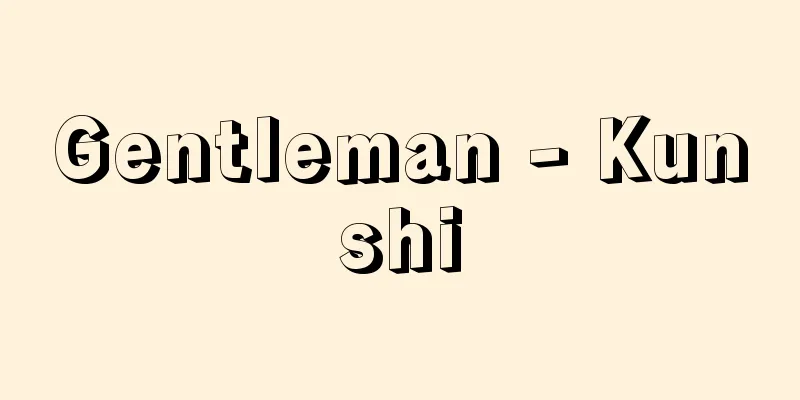Gentleman - Kunshi

|
〘noun〙① A person who is in a higher position than the general public. A person of high rank or high official status. A person who governs. A ruler. *Mingoji (1275), vol. 6: "A gentleman is not biased in the way of government." [Ceremonies - Shizōkenrei] ② A person endowed with virtue. A person of excellent learning and character. A person of great character. In China, an educated person who has acquired Confucian morality. Generally belongs to the class of scholar-officials. It is also sometimes used to show respect to others in a broad sense. ⇔A small person. *Kaden (around 760), vol. 1: "Especially Mongolia, he is so gracious in his kindness that he wishes for nothing better. Surely he would command his sovereign to be the emperor. A gentleman does not eat his words, but only observes his actions." [Book of Documents - Yu Mo the Great] ③ A word a wife uses to show respect to her husband. My husband. Master. ※Bunka Shureishu (818), Part 2, Howa Shun'ei En (Sugawara Kiyomitsu), "In the four and five seasons of beauty, it is proper etiquette . A gentleman follows one who is righteous and a lady." (Shijing - Shonan, Sochu) ④ In oriental painting, it refers to the four gentlemen of plum, bamboo, chrysanthemum, and orchid. ⑤ A beautiful name for "lotus." ※Kourin Su-chi (maybe mid-18th century) 2, "I declare that the lotus flower is a beautiful flower." ⑥ A beautiful name for "tsuru (crane)." ※Suga Kake Bunsou (around 900), Part 4, Hayaso (early frost), "A gentleman makes no sound in the depths of the night, and the old man is alarmed by his temples in his later years." Source: The Selected Edition of the Japanese Language Dictionary About the Selected Edition of the Japanese Language Dictionary Information |
|
〘名〙① 一般民衆より上位の立場にある人。高位・高官の人。政治を行なう人。為政者。※名語記(1275)六「君子は政道において、偏頗をなさせ給はざれば」 〔儀礼‐士相見礼〕② 徳行のそなわった人。学識、人格ともにすぐれたりっぱな人。人格者。中国で、儒教の道徳を身につけた教養人。一般に士大夫の階級に属する。また、広く他者に敬意を表わして用いる場合もある。⇔小人。※家伝(760頃)上「殊蒙厚恩、良過所望、豈无レ令汝君為帝皇耶、君子不食言、遂見其行」 〔書経‐大禹謨〕③ 妻が夫に敬意をもっていうことば。わが夫。主人。※文華秀麗集(818)中・奉和春閨怨〈菅原清公〉「四五芳期当レ順レ礼。出従二君子一正為レ嬪」 〔詩経‐召南・草虫〕④ 東洋画で、梅・竹・菊・蘭の四君子(しくんし)をいう。⑤ 「はす(蓮)」の美称。※交隣須知(18C中か)二「蓮花 ハスノハナヲ クヮチフノ クンシト 申マス」⑥ 「つる(鶴)」の美称。※菅家文草(900頃)四・早霜「君子夜深音不レ警、老翁年晩鬢相驚」
出典 精選版 日本国語大辞典精選版 日本国語大辞典について 情報 |
>>: Military-industrial complex
Recommend
Petrus de Alliaco (English spelling)
…French theologian and author. Latin name Petrus ...
Niihari [village] - Niihari
A village in Niiharu County, central Ibaraki Prefe...
Cutting and splicing
… [Grafting method] Grafting methods are broadly ...
Radioactive decay series
Since there are no stable isotopes for elements wi...
House quality - Kajichi
Mortgages of houses in the Edo period. The word &...
Ergotoxine
…Cows are weaker than horses. [Medicinal] Ergot c...
Ubamegashi - Ubamegashi
An evergreen shrub or small tree of the Quercus g...
Western [Islands] - Uestan
…the islands are located off the northwestern and...
Moxibustion - Moxibustion
A form of traditional Chinese medicine in which m...
Canoeing
… [Kenichi Sudo] [Canoeing] A sport in which peop...
Cricetus cricetus (English spelling) Cricetus cricetus
…They vary in size, with the smallest species bei...
Potomac [river] - Potomac
A river in the eastern United States. It originate...
Schilder's disease
...However, the defective enzymes in lipid metabo...
Red tongue sole
A marine fish belonging to the order Pleuronectif...
Kyushu University Live Dissection Incident - Kyushu University Live Dissection Incident
…The experimental data was secretly taken back by...









